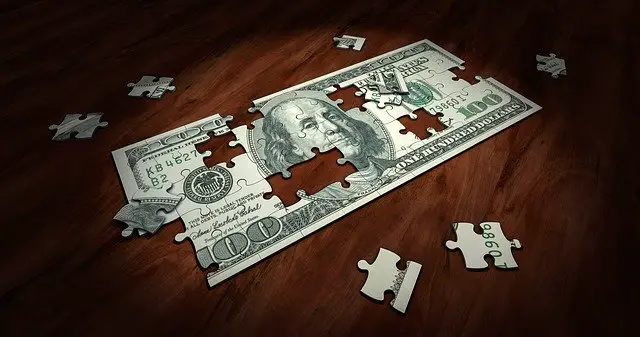As women, we may not be comfortable discussing finances. We might feel as though we haven’t been raised with the appropriate understanding, or maybe we were told that money isn’t a “woman’s thing.” However, in the contemporary world; all of us have to take care of our finances in order to progress.
It’s high time we leave the stereotypes. There’s no need for us to shrink back from taking an ardent interest in finances. Women are getting more money than ever before and possess the control to be as prosperous as men. Now, a lot are out-earning their male partners. There is money; we only have to learn how to maximize it.
In the next chapters, you’ll get to know about the practical tools you require to be in charge of your finances – such as getting out of debt, defending yourself from the unforeseen, saving money, and developing your riches.

Chapter 1 – Your path to financial success starts with the motivation to make the transformations you require.
If you’ve ever attempted to shed weight and be in shape, you’ll understand there are no immediate answers. Just like any other huge new life phase, you’ll have to be ready for transformations in order to accomplish your financial aims. You need to let yourself dream and be bold that your dreams can turn into reality.
The secret to being in charge of your finances is to make peace with the largest mental hindrance – the money errors that you’ve made previously. Fixating on these is what unnecessarily prevents a lot of us from moving forward.
Every one of us makes mistakes and squanders money; however, it is possible for you to move on from this rather than being trapped. The first thing to do is admit to them and forgive yourself. In order to do this, you can write down how you feel or even scream out your feelings loud if you have to. Getting your bottled-up feelings out there is usually therapeutic and will assist you to let go.
It’s a matter of inner determination to prosper. As soon as you know that the past remains in the past, you’ll not see the need anymore to criticize or blame yourself for what has already occurred and can concentrate on the future. Similar to committing to workout, you can purchase the entire extravagant gear in the universe; however, if your mind isn’t in it, it won’t assist you to grow those muscles.

The next thing to do is to learn the lessons from your errors and begin altering your approach to money.
To pinpoint those lessons, a good approach is to take that pen and paper once again and do some deep reflection. Write down the whole wrong decisions you’ve made with money in your past, regardless of how big or trivial. Also, pen down what you can learn from this and how you can do improve in the future.
These will be your guidelines for action. For instance, let’s say formerly, you had a tendency to spend above what is needed on designer handbags and never gave attention to saving, you can choose to save $5 per week right away. Even if it’s a small amount, it’s the consistency of the action that will put you on the right path and assist you to trust that a different financial future is likely.
Chapter 2 – Make life very easy by organizing your finances before you take any action.
You wouldn’t attempt to navigate your way around a new city if you don’t have a map. Likewise, if you wish to attain financial happiness, understanding where you’re heading to and how to get there is vital. Organizing your spending will assist you to form a map of your financial territory and work out a better way of working through it.
Begin by keeping a record of your entire spending. Jot down each and every single transaction for the first two weeks, check it daily, and notice where you spend the most. By doing that, you’ll become conscious of the entire bad habits you got into without knowing, maybe it’s overspending or paying your bills late. Also, then you can begin improving them.
Stopping a habit is usually a difficult slog – research reveals that it requires an average of 66 days. However, knowing what you’re up against will make the process easier. Also, it is very easy to make adjustments if you swap bad habits with new, better deeds. For instance, say you realize that you usually branch by a cafe while going to work to buy costly coffee, you can attempt taking another path in the morning – and make a coffee for yourself when you arrive at work.

A different aspect of organizing yourself is knowing where you are headed. This is the point where defining your values as well as setting goals comes in.
One approach to do this is to sit down and discover what’s most significant to you in life. Do you wish to travel and explore? Develop your wealth? Give back to the community? There are no right or incorrect answers – it’s totally personal. The secret is to be clear about your values in order for you to be able to prioritize as you make your financial plans.
Setting goals is the next aspect. By doing that, you’ll end up with a plan that can direct you. You’ve already seen the big picture when you thought about your values. Now make your dreams more real in the shape of precise short-, medium-, and long-term goals. For instance, you might target to be debt-free in five years, have your own house in ten, and have adequate to retire easily in 25.
As soon as you have a clear outline of your financial aspect, you can proceed to the precise steps that will assist you to succeed.
Chapter 3 – The secret to making the most of the money you have is budgeting and that can be done in a manner that suits you.
A glass of wine with your friend, a new shirt for work, a forgotten bill – ever thought of the reason why you end up finding it difficult to survive those last few days before the following paycheck?
The best way to prevent this circumstance is through budgeting. It signifies that it is you that is telling your money what to do, rather than falling into the trap of unintended spending.
A budget may seem restrictive; however, it doesn’t need to be rigid or even the same each month. Everything rests on your salary and what you need. The vital thing is to pay your essential expenses (such as rent and bills) first, and then plan for another spending, such as traveling or treating yourself to a night out.
Keeping track of your entire salary and outgoings can become difficult; therefore, categorize your budget to keep it organized. For instance, rent and bills fall under “essentials.” Also, it is a good thing to have an emergency fund and some money set apart for goals, such as saving for a holiday or a home. A catch-all “everything else” category will cover the remaining things.

Now, you understand the reason why it sensible to have a budget and plan your spending. Done right, it’ll provide you more charge over your money. However, how can you remain motivated and evade the feeling that you’re including just another bothersome chore to your already busy day-day routine?
In order to make your budget a more satisfying addition to your life, do it in a manner that fits you. For instance, people that have a steady predictable salary find it beneficial to divide it into percentages, in order to allocate, say, 30% to your rent, 20% to your goals, and so on. Other people do better with the old cash-in-envelopes manner of budgeting, where you set apart certain money amounts for each category based on the amount you have in hand. Also, for digital natives, there are a lot of apps that automate the tracking, so that the only thing you need to do is check in on a regular basis.
A different trick to making budgeting pleasant is to remember to add rewards. But ensure that you use these for things that really make you glad, such as spending time with the people you love.
Chapter 4 – Debt can get overwhelming; however, with new priorities and the appropriate tactic, you can get ahead of it.
It’s very easy to become discouraged by even a little amount of debt, particularly if you’re still paying for the items that have already turn into distant memories, such as those carefree student years.
The first thing to do is to have a clear picture of your circumstance. Start by jotting down the whole thing you owe. Find all those credit card statements, overdrafts, and loans to have a comprehensive outline. It may be painful; however, it’ll aid you to make good choices afterward.
To begin with, it’ll let you sort out the good debt from the bad debt, and hence know which one to deal with first. Good debt is debt that has the potential to bring you a financial advantage –such as a mortgage. It’s still debt; however, it is possible for your house to increase in value, and at the very least you’ll eventually own it at last. On the contrary, bad debt is nothing other than a liability. A major illustration of that is of a credit card balance because the money is long gone and you have to pay for things that aren’t giving you any financial benefit now. Also, paying off bad debt has to be your top priority.

The following step is to decide a tactic to pay off your debt. In the field of finance, there are two common methods to do this. The first method is the snowball. In order to do this, you begin with the least of all your debts and deal with that first. Then you move to the next-smallest and continue going until your debts vanish one after the other. It’s really motivating, as you notice the outcomes fast. But, you might end up paying more eventually, as you’ll keep paying interest on your biggest debts.
The second method is the avalanche method. With this, you begin with the debt that has the highest interest rate. By decreasing the amount, you reduce the amount of interest you need to pay in total. However, this can be difficult. If your largest debts are also the debts with the highest interest, you’ll most likely need to wait for a bit for your first win.
It is your choice to choose whatever methods; what’s significant is abiding by the plan.
Chapter 5 – In order to grow your wealth and put your money to work, begin investing in the stock market.
The stock market might look like an alien world; however, it isn’t as difficult as it looks. Anybody can learn the fundamentals, and you don’t require a large amount of money to begin.
Why do you have to care? The best thing you can do with your money in the long is investing since it is how your money increases.
It boils down to just a single word: compounding, which is the process by which investing grows your wealth. It operates like this. When you receive interest on your investment, the interest is combined to your balance. For the time being, the balance keeps on receiving interest, which entails that the interest now receives interest on itself. With time, that will actually add up.
For instance, assuming you begin with $1,000 and get 10% interest. In one year, you’ll have $1,100. However, the next year, the added $100 will also be receiving interest. Therefore, at the end of the second year, you’ll have $1,210. Also, the next year, there will be an additional $110 earning money for you. Every year, the amount made without any extra effort grows. In 25 years, you’ll have received above $9,000 on that initial investment even if you never add any money into that account ever again.
The advantages of investing are clear; however, where do you begin? Let’s get to grips with some simple principles.

First of all, it’s significant to know that investment is a long-term approach. The stock market is difficult to forecast; therefore, a temporary fall could bring about short-term losses. However, averagely, over the long-term, the trend is upward. In order to make the most of this, think of something like retirement: a perfect long-term investment aim.
One other thing to put into thought when thinking about investing is the amount of risk you can handle or your risk tolerance. Every investment comes with some type of risk that you will lose the money. When you begin researching investments, you can liken them by their risk profile, a measure that informs you how risky an investment is. As a starter, it’s a good thing to go with the low-risk options while you’re still figuring everything out.
As soon as you’re more skilled and comfortable with investing, you can begin checking the higher-risk choices. Meanwhile, don’t be intimidated by the entire choices that are available, and have the boldness to make your own choices.
Chapter 6 – Credit can be a good thing provided you understand how to make use of it to your benefit.
Do you wish to purchase a house or dream of having your own company? Except you’re already wealthy, you’ll require credit to do this whole thing.
Although no one wishes to run into debt and not be able to pay back the debt, credit is what lets you utilize financial opportunities that will assist you to grow your riches and live the type of life you desire.
For instance, renting a house, being granted a mortgage, or even having a phone contract are very easy to do if you possess a good credit score – a measure that shows loan and service providers how much of a risk you are when it is the situation of paying back what you owe.
Therefore, it is sensible to acquaint yourself with your credit score and to know what goes into it to ensure you can use credit sensible. Your credit score is based on your credit account, which is a record of how well you’ve been paying your loans and bills. Also, all this is kept in your credit report, which you can and should access to scrutinize for its accuracy.

As soon as you’ve determined what your present record is, you can begin taking steps to ensure you have a good credit score.
This clearly entails that you have to pay your bills before the deadline. However, you have to also pay off your debts and –maybe astonishingly – not close your credit card accounts. Provided you pay before the deadline, keeping a credit card up and running will have a positive effect on your score. It’s a method of developing a consistent record of paying bills when they’re due.
Conversely, if your credit score is poor, don’t be hopeless. Saying the bad credit can’t be rebuilt is just a myth. It’s completely possible to enhance it with time by working on those bad habits, changing them into good ones, paying bills before it is due, handling your debts, and coming to agreements with collection agencies if required. Also, it can be a good thing to get professional counseling or training to assist you to clean the slate.
Regardless of what your circumstance is, ensure to keep a watch on your credit to evade undesirable surprises.
Chapter 7 – It is significant for financial health to protect yourself from unexpected hindrances.
What would you do if your house got burnt down? Or you were affected by a severe disease? Nobody likes to think about the tragedies that could happen to us; however, bad things actually occur, and they can truly put pressure on our finances.
Luckily, there are strategies we can use to protect ourselves from the effect of emergencies or other unexpected situations. The appropriate type of insurance can go a really long way toward reducing or totally preventing the damage.
Health insurance, as well as auto insurance, are the clear illustrations; in a lot of places, it’s even illegal not to have these things. Also, there are good causes for this. For instance, in the US, a slight car accident might cost $8,000 in repairs and hospital bills; however, with insurance, the only thing you would need to pay is the considerably lesser $500 deductible. Also, your financial plans would not be affected.
If you think of the price it would cost to change the contents of your home or to save your dog’s life in an emergency, you can as well notice the value of other kinds of insurance. As a homeowner, a renter, or a pet owner, it’s a good thing to take steps to protect what’s significant to you and prevent the possibility of financial damage.

However, it’s not just situations in your personal life that can have an impact on your financial well-being. The economy can have a major effect as well. The reason is that economies have a tendency to fluctuate – they undergo cycles of increase and decline. During the time of decline – or recession – economic activity reduces, fewer goods are manufactured, and there is less demand for services. Due to that, layoffs as well as unemployment increase.
However, even if you get sacked from work, you have to eat and bills need to be paid, and that’s how debt can increase. Therefore, it’s a good idea to plan for that kind of eventuality. The vital steps are to work on your emergency fund, pay your debts off, live within your earnings, and make various income streams. You can survive an economic storm very easy if there is a 12 months’ expenses saved up and no concerns about debt.
Also, in the meantime, you can make use of the secure base you’ve created to form new opportunities for financial success, which we’ll examine in the next chapter.
Chapter 8 – You can make extra cash by learning to use unexplored possibilities in your work as well as personal life.
Women usually have difficulty asking directly for what they deserve –particularly when it comes to money. However, it doesn’t need to be like that.
A lot of us undervalue ourselves while negotiating our salary. surprisingly, statistics show that a woman may lose between $1 and $1.5 million during the course of her working life by not pushing for more salaries.
However, there are tangible steps you can take to turn into a better negotiator and receive the higher wage you deserve. On the one hand, it’s vital to do your research on the normal pay range for your work position and be realistic with what you expect. In contrast, the vital thing is to set your concerns aside and act. For instance, you could plan for a meeting regarding your wage by reminding yourself of the thing that makes you stand out and dear to your employer and even practice what the things you will say in front of the mirror.
However, that’s not the only method to increase your income. If you look beyond your work and ponder on the things you’re good at and relish, you can get surprising possibilities to make some cash on the side. Maybe it is baking or selling online, the options are numerous.
In order to have a thriving side job, the first thing you need to do is to have a plan for organizing your business. Definitely, you have to make sure the financial aspect is figured out. This is the situation of how to generate money. It comprises of thinking about problems such as fixing your prices, covering your business expenses, and planning a budget. You have to plan it down to each detail, as well as things such as paying for website hosting.

However; you also have to question yourself what type of value as well as experiences you want to offer, and what that entails in practical terms. Assuming you wish to establish a new luxury brand. What will you do to deliver that luxury experience to clients? What are the things you need to put in place to make that a reality? It can boil down to things such as packaging and having the appropriate website design. Also, remember to figure out the logistics, such as how you’ll really deliver the goods.
Earning cash from something you relish is both personally and financially fulfilling; therefore, confront your fears and build the tactic you require for success.
Clever Girl Finance: Ditch Debt, Save Money and Build Real Wealth by Bola Sokunbi Book Review
As women, we’ve been raised with so many mental baggages that hinders us from attaining our complete financial potential; however, we can take tangible steps to attain financial well-being. The steps we can take comprise paying off our debts, negotiating for a better salary, as well as learning about investing. Regardless of what your present work and income circumstances are, you can be in charge of your money, release yourself of debt, and create a good foundation of savings and investments to live the life that you wish for.
Motivate yourself!
Keep your concentration as well as enthusiasm on the long path to attaining your financial goals by having a list of fun sources of inspiration to remain motivated. These can comprise interesting books, podcasts, as well as financially savvy friends. Give yourself a timeframe for dealing with the list. That’s what will make you going and remind you of the reason you started this journey.
